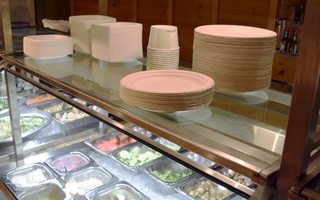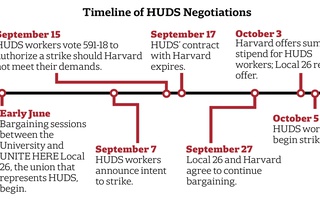
Robert A. James, a Quincy Dining Hall cook, speaks to Jacqueline D. Modesett ’17 and Jade E. Miller ’17 about the potential HUDS strike over dinner.
Members of the undergraduate group Student Labor Action Movement and several Harvard University Dining Services employees made speeches and held informational sessions in three College dining halls Thursday night to gather support for HUDS’ recent vote to authorize a strike.
Last week, HUDS workers voted 591-18 to authorize a strike should the University not comply with their demands for increased minimum salaries and different health care benefits.
SLAM members set up tables in Hillel, Quincy, and Mather dining halls to discuss the potential HUDS strike and to encourage student involvement, asking diners to remain quiet momentarily while they spoke. Students also passed out fliers and small buttons reading "Support the strike."
In each of the dining halls, a HUDS worker stood up and gave a personal testimonial to dining students.
Robert A. James, a cook in Quincy dining hall, spoke on behalf of HUDS workers during the teach-in at Quincy to express concern about proposed changes to HUDS insurance benefits.
“I’m a father with a beautiful five-and-a-half-year-old girl,” he said. “But when we gave birth to our daughter, there were some complications. It ended up being an ordeal that lasted for five days.”
He added that, because of his previous health coverage through HUDS, he was able to afford the procedures his wife and daughter needed. He claimed the proposed health care package from the University may increase what he would need to pay for such procedures.
According to University spokesperson Tania deLuzuriaga, the average HUDS employee would likely see an increase in cost “of less than $11/month under the plan Harvard has proposed.”
Connecting his personal anecdote to the HUDS strike authorization, James said that most HUDS workers are “only two paychecks away from abject poverty.”
“With housing rents as expensive as they are in Boston, you’ll definitely feel that pinch,” he said. “It’s just not fair.”
In a statement, deLuzuriaga wrote that “Harvard’s dining workers currently receive highly competitive wages that lead the local and national workforce for comparable positions in the foodservice industry.”
In each dining hall, SLAM organizers stressed the importance of the student body’s involvement in supporting strike efforts.
Grace F. Evans ’19, who helped organize the Mather tables, said it was not a coincidence the teach-ins were held on Thursday, which is community dinner night at the College. “It’s a great time to talk about our community and those who are vulnerable in it,” she said.
Echoing Evans, Anastacia M. Valdespino ’18 said hosting the teach-ins during community dinner “really offers the chance for the House system to be a built-in organization that is supporting [HUDS strike].”
According to Valdespino, SLAM had been collaborating with UNITE HERE Local 26, the Boston-based union that represents HUDS, in organizing the teach-ins.
“We’ve had a union rep who has been giving us a lot of information,” she said, noting that the group's handouts for the sessions were made by a former SLAM member who has since joined Local 26.
According to Valdespino, SLAM intends to host teach-ins in each of the remaining undergraduate dining halls over the next couple of weeks.
—Staff writer Julia E. DeBenedictis can be reached at julia.debenedictis@thecrimson.com. Follow her on Twitter @julia_debene.
—Staff writer Derek G. Xiao can be reached at derek.xiao@thecrimson.com. Follow him on Twitter @derekgxiao.
Read more in University News
A Guide to Harvard's EndowmentRecommended Articles
-
 Harvard Stockpiles Frozen Food Ahead of Potential HUDS Strike
Harvard Stockpiles Frozen Food Ahead of Potential HUDS Strike -
 With Strike Looming, Some Students Unconcerned About their Next Meal
With Strike Looming, Some Students Unconcerned About their Next Meal -
 Harvard—and Dining Workers Union—Prepare for Day One of Strike
Harvard—and Dining Workers Union—Prepare for Day One of Strike -
During Strike, Harvard Finds Alternate WorkersAbout 70 HUDS managers, 15 temporary hires, and 15 Harvard employees worked in the dining halls to serve meals throughout the day, a fifth of Harvard's usual labor supply.
-
Students Concerned About Food Safety, Options as HUDS Strike Drags OnStudents have reported finding undercooked meals, meat mixed in with vegetarian food, and insects in their food, prompting some to wonder whether understaffed kitchens are able to maintain regular health and safety standards.













